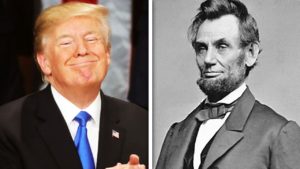By ROBERT KOFMAN
 President Trump likes to compare himself to President Lincoln and indeed there are some similarities. Both won with less than a majority of the popular vote and took office in a deeply divided, polarized country with a substantial portion of the media engaging in virulent personal attacks on their character. They both expanded the President’s executive power to address what they saw as threats to homeland security and they devised new ways to communicate with the people.
President Trump likes to compare himself to President Lincoln and indeed there are some similarities. Both won with less than a majority of the popular vote and took office in a deeply divided, polarized country with a substantial portion of the media engaging in virulent personal attacks on their character. They both expanded the President’s executive power to address what they saw as threats to homeland security and they devised new ways to communicate with the people.
Read the rest of this entry »
Posted: February 25th, 2019 | Author: admin | Filed under: Donald Trump, Opinion | Tags: Abraham Lincoln, Donald Trump, Opinion, Robert Kofman | 1 Comment »
 By Evans C. Anyanwu
By Evans C. Anyanwu
If abolitionist Frederick Douglas appeared today in New Jersey and asked for political support from the African American community, he might be surprised at the fact that his political affiliation would far eclipse his accomplishments. Douglas was a Republican.
In April of 1865, shortly after the Civil War ended, and President Abraham Lincoln was assassinated, Douglas gave a speech at the Annual Meeting of the Massachusetts Anti-Slavery Society in Boston. At issue was the voting rights of Black men and to this subject Douglas remarked:
“I have had but one idea for the last three years to present to the American people, and the phraseology in which I clothe it is the old abolition phraseology. I am for the immediate, unconditional, and universal enfranchisement of the black man, in every State in the Union. Without this, his liberty is a mockery; without this, you might as well almost retain the old name of slavery for his condition; for in fact, if he is not the slave of the individual master, he is the slave of society, and holds his liberty as a privilege, not as a right. He is at the mercy of the mob, and has no means of protecting himself.”
Drawing loud applauses from the previous line, Douglas went right into the heart of his speech. He deviated from the conventional thought of most abolitionists, which at the time was that the right to vote should come last. The immediate need for African Americans, most thought, was to end slavery, organize and let voting naturally come at the end of the abolitionist movement. Douglas remarked: “It may be objected, however, that this pressing of the Negro’s right to suffrage is premature. Let us have slavery abolished, it may be said, let us have labor organized, and then, in the natural course of events, the right of suffrage will be extended to the Negro. I do not agree with this.”
Five years after his speech, the ratification of the Fifteenth Amendment to the United States Constitution prohibited the States and Federal government from denying African Americans the right to vote. Thereafter, Thomas Mundy Peterson, a Republican, on March 31, 1870 cast the first vote ever by a Black man, under the just-enacted Amendment, during the Perth Amboy, New Jersey, School Board Elections.
The right to vote, not only for African Americans, but for women, was very important to Douglas. So it is with this background that I write about a very important vote to ensue. There is likely to be a committee vote this month to advance the nomination of Bruce A. Harris, Esq. to the Supreme Court of the same State where Thomas Mundy Peterson cast his historic vote.
Read the rest of this entry »
Posted: May 10th, 2012 | Author: admin | Filed under: NJ Courts, NJ Judiciary, NJ Supreme Court | Tags: abolitionistiss, Abraham Lincoln, African American community, African Americans, Bruce A. Harris, Bruce Harris, Chatham, Civil War, Clarence Thomas, Democrat, Esq., Evans C. Anyanwu, Fifteenth Amendment, Frederick Douglas, Massachusettss Anti-Slaverery Society, Negro, Perth Amboy, Republican, Sandra Day O'Connor, Supreme Court Justice, Thomas Munday Peterson, Yale Law School | 9 Comments »
 President Trump likes to compare himself to President Lincoln and indeed there are some similarities. Both won with less than a majority of the popular vote and took office in a deeply divided, polarized country with a substantial portion of the media engaging in virulent personal attacks on their character. They both expanded the President’s executive power to address what they saw as threats to homeland security and they devised new ways to communicate with the people.
President Trump likes to compare himself to President Lincoln and indeed there are some similarities. Both won with less than a majority of the popular vote and took office in a deeply divided, polarized country with a substantial portion of the media engaging in virulent personal attacks on their character. They both expanded the President’s executive power to address what they saw as threats to homeland security and they devised new ways to communicate with the people.
 By Evans C. Anyanwu
By Evans C. Anyanwu